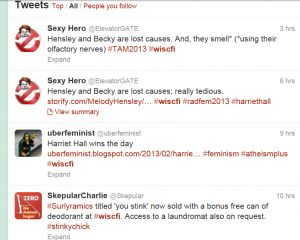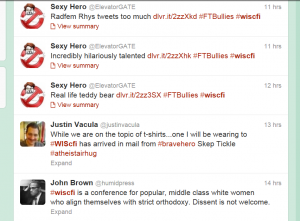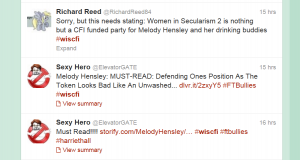Guest post by Landon from the Churchland on morality and science thread.
@alqpr: I share the concerns of those who object to the weight you seem to attach to the authority of so-called “experts” in moral philosophy rather than just looking at the quality of the arguments.
To quote Ophelia, “Those? Who?”
In any case, I cannot find a single instance of Ophelia (or myself, for that matter) leaning on the expertise of an individual as a surety that the conclusions are good, rather than as a heuristic device for finding better arguments. In short, do not mistake “Experts are more likely to have good arguments” for “this is a good argument (solely) because it was forwarded by an expert.” Ophelia and I have both said something like the former, but neither of us have said anything like the latter.
But wrt the training issue, I have to add that in my opinion Harris appears even more naive than Shermer, and Harris does at least have a BA in philosophy and according to Wikipedia he IS a “philosopher”
A BA doesn’t make you a philosopher. It indicates that you might be qualified to train as one. See my post at #11 – this has been dealt with already.
If I am proposing a “new” solution for an old problem I would be well advised to ask a philosopher to assess its novelty and point out any weaknesses. But If I see an error in someone else’s argument I don’t need an expert to tell me whether it’s really an error.
I am glad, at least, that you see the value in philosophical training. Likewise, I don’t dispute that you NEED not be a philosopher to see an obvious error in an argument. However, many arguments offered by philosophers have been cleansed of OBVIOUS errors, so if the argument is at all competently formed, it’s going to take someone who has a good degree of philosophical competence to spot what errors persist. And, in my experience in teaching, undergrads frequently misunderstand the force of certain objections and misconstrue the consequences of various errors they detect. They also, usually due to lack of understanding of the nuances of certain terms of art, believe they see objections where none actually exist, which they would know if they had a greater familiarity with the supporting literature and thus a better understanding of the significance of the author’s use of THIS term or THAT term, rather than some other, in the context of the argument. So it’s not always true that you don’t need an expert to tell you if the error you (think you) see is really an error.
Finally,
I would be most grateful if either Ophelia or Landon (or anyone else!) could point me to even one example of an interesting (philosophical) problem that has been solved by an “expert” and explained in terms that Richard Feynman would find simple enough to justify a claim of real “expert” understanding.
I won’t address Feynman’s criteria except to note that Feynman, while a brilliant scientist, had a only very shaky grasp of what philosophy was about and repeatedly displayed ignorance regarding the methods, aims, and value of philosophy. In any case, the question is poorly formed. Philosophy does not “solve” problems in the scientific sense because philosophical problems are, by definition, beyond the realm of empirical investigation – that is, we can never “point to” some set of evidence that “proves” some particular answer is the correct one. Indeed, to the extent that a problem is amenable to such solutions, it migrates OUT of philosophy’s domain.
Philosophy problems are only ever more or less “settled,” because, lacking the ability to investigate the issues empirically, we (philosophers) try to define terms very clearly and then make the best arguments we can for various possible answers to the problems. We critique these arguments, and take the most plausible, least ontologically-promiscuous valid argument to be the best one. As “most plausible” is somewhat subjective, there will never be perfect agreement on any proposed solution, but that’s to be expected when we cannot appeal to the stern, austere realm of physical evidence for a final ruling. That said, there is a large degree of consensus on a number of issues, all of which are philosophical problems that have been at various points throughout history hotly contested by professional philosophers, and all of which were largely settled through the work of people who were essentially, for their respective eras, professional philosophers. A small sampling of these issues includes:
1) Materialism is the proper paradigm for understanding the operation of the mind (a refutation of dualism).
2) Religious belief is not rationally required (and there is only a rear-guard action maintaining that it is rationally permissible).
3) The correct paradigm for analyzing ethical problems is some variant of consequentialism that includes a concept of rights.
4) Democracy with universal adult suffrage is not only rational and ethically justifiable, it is probably the only rational and ethically justifiable form of government.
This doesn’t even mention the important work in logic that has made modern computer science possible.
The problem you may be running into, which trips up a lot of people, is that by the time a non-philosopher runs into a philosophical issue that has reached consensus, it has already seeped into the culture and looks a lot like “common sense.” It can be hard to remember that there was a time that universal suffrage was not taken for granted as the “right” way to do things, when democracy itself was a mad, experimental proposal. Non-philosophers tend to point to the people who campaigned to bring those ideas to realization in the social and political systems, but those people were almost always persuaded of the rightness of their cause by reading the philosophers who championed those ideas in the first place. The founders of the United States brought forth constitutional democracy into this world, but they did so after becoming convinced by Locke and Rousseau of the correctness of such an enterprise. If you’re having trouble figuring out what effect philosophy has had on the world, look at a map depicting the number of governments founded on the principle of constitutional democracy throughout history.


(This is a syndicated post. Read the original at FreeThoughtBlogs.)



